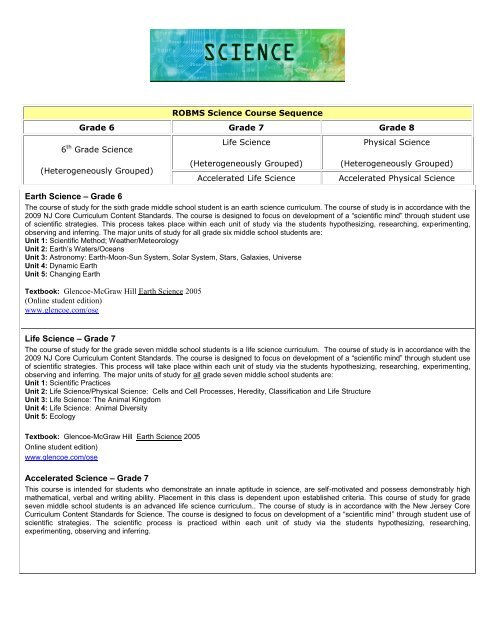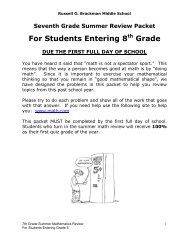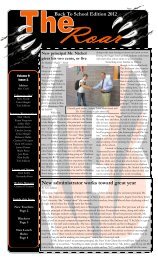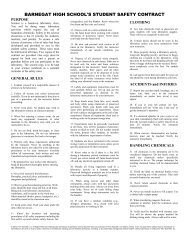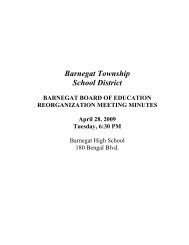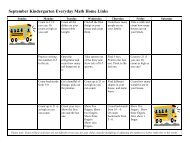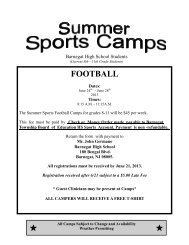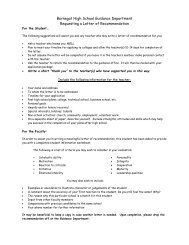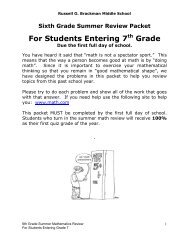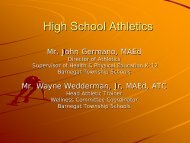Middle School Science Program
Middle School Science Program
Middle School Science Program
Create successful ePaper yourself
Turn your PDF publications into a flip-book with our unique Google optimized e-Paper software.
ROBMS <strong>Science</strong> Course Sequence<br />
Grade 6 Grade 7 Grade 8<br />
6 th Grade <strong>Science</strong><br />
(Heterogeneously Grouped)<br />
Life <strong>Science</strong><br />
(Heterogeneously Grouped)<br />
Accelerated Life <strong>Science</strong><br />
Physical <strong>Science</strong><br />
(Heterogeneously Grouped)<br />
Accelerated Physical <strong>Science</strong><br />
Earth <strong>Science</strong> – Grade 6<br />
The course of study for the sixth grade middle school student is an earth science curriculum. The course of study is in accordance with the<br />
2009 NJ Core Curriculum Content Standards. The course is designed to focus on development of a “scientific mind” through student use<br />
of scientific strategies. This process takes place within each unit of study via the students hypothesizing, researching, experimenting,<br />
observing and inferring. The major units of study for all grade six middle school students are:<br />
Unit 1: Scientific Method; Weather/Meteorology<br />
Unit 2: Earth’s Waters/Oceans<br />
Unit 3: Astronomy: Earth-Moon-Sun System, Solar System, Stars, Galaxies, Universe<br />
Unit 4: Dynamic Earth<br />
Unit 5: Changing Earth<br />
Textbook: Glencoe-McGraw Hill Earth <strong>Science</strong> 2005<br />
(Online student edition)<br />
www.glencoe.com/ose<br />
Life <strong>Science</strong> – Grade 7<br />
The course of study for the grade seven middle school students is a life science curriculum. The course of study is in accordance with the<br />
2009 NJ Core Curriculum Content Standards. The course is designed to focus on development of a “scientific mind” through student use<br />
of scientific strategies. This process will take place within each unit of study via the students hypothesizing, researching, experimenting,<br />
observing and inferring. The major units of study for all grade seven middle school students are:<br />
Unit 1: Scientific Practices<br />
Unit 2: Life <strong>Science</strong>/Physical <strong>Science</strong>: Cells and Cell Processes, Heredity, Classification and Life Structure<br />
Unit 3: Life <strong>Science</strong>: The Animal Kingdom<br />
Unit 4: Life <strong>Science</strong>: Animal Diversity<br />
Unit 5: Ecology<br />
Textbook: Glencoe-McGraw Hill Earth <strong>Science</strong> 2005<br />
Online student edition)<br />
www.glencoe.com/ose<br />
Accelerated <strong>Science</strong> – Grade 7<br />
This course is intended for students who demonstrate an innate aptitude in science, are self-motivated and possess demonstrably high<br />
mathematical, verbal and writing ability. Placement in this class is dependent upon established criteria. This course of study for grade<br />
seven middle school students is an advanced life science curriculum.. The course of study is in accordance with the New Jersey Core<br />
Curriculum Content Standards for <strong>Science</strong>. The course is designed to focus on development of a “scientific mind” through student use of<br />
scientific strategies. The scientific process is practiced within each unit of study via the students hypothesizing, researching,<br />
experimenting, observing and inferring.
Physical <strong>Science</strong> – Grade 8<br />
This course is intended to provide a background of information in science and a foundation for future school science courses. Students<br />
receive instruction in the areas of chemistry, astronomy, and the related physical sciences. This material is presented and practiced using<br />
a variety of learning tools and modalities: labs, demonstrations, hands-on activities, writing, computers applications and outside resources.<br />
Audio visual presentations via videos, DVDs and internet sites will be used in presentation. Student research work in the IMC is<br />
incorporated into the course.<br />
Unit 1: <strong>Science</strong> Skills, Lab Technique, Measurement and Scientific Notation; Physical <strong>Science</strong>: Forces and Motion<br />
Unit 2: Thermal Energy, Electromagnetic Spectrum, and Energy Transformations; Atoms, Compounds and Mixtures<br />
Unit 3: Chemistry: Properties of Matter, Atoms and the Periodic Table; Chemical Bonding, Chemical Reactions<br />
Unit 4: Physical <strong>Science</strong>: Force, Motion, Work; Electricity and Magnetism<br />
Unit 5: Environmental Protection and Global Warming<br />
Textbook: Glencoe-McGraw Hill: Introduction to Physical <strong>Science</strong> 2005<br />
Online student edition)<br />
www.glencoe.com/ose<br />
Grade Eight Advanced <strong>Science</strong><br />
This course is intended for students who demonstrate an innate aptitude in science, are self-motivated and possess demonstrably high<br />
mathematical, verbal and writing ability. Placement in this class is dependent upon established criteria. Students should have a desire to<br />
continue in academically advanced science courses in high school. Through this course students receive instruction in the areas of,<br />
chemistry, the related physical sciences, and environmental science. This material is presented and assessed through a variety of<br />
learning tools and modalities: labs, demonstrations, hands-on activities, writing, computer and technology application. Resources such as<br />
videos, DVDs, and the internet are incorporated into the course. Students are required to research topics as part of their coursework.


